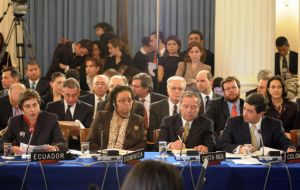MercoPress. South Atlantic News Agency
OAS resolution eases tension between Colombia and Ecuador
 Colombia accepted it had violated Ecuadorian sovereignty bu twas not condemned
Colombia accepted it had violated Ecuadorian sovereignty bu twas not condemned The Permanent Council of the Organization of American States (OAS) on Wednesday approved a resolution stating Colombia violated Ecuador's sovereignty with a cross-border raid to kill a leftist rebel over the weekend.
The move sought to defuse the tension that had been mounting among Andean nations, after Ecuador and Venezuela broke diplomatic relations with Colombia and sent extra troops to their borders with that country to protest the action. Venezuela also closed its border to trade. The resolution did not include a condemnation of the Colombian military operation Saturday on Ecuadorian soil, but did feature an explicit acknowledgement that Colombia violated Ecuadorian territory. The raid on Saturday - reportedly triggered after a phone call from Venezuelan President Hugo Chavez to the rebel leader was tracked to the area - claimed the lives of Raul Reyes, second-in-command of the Revolutionary Armed Forces of Colombia (FARC), and some 20 other rebels. The OAS resolution also establishes the creation of a commission headed by OAS Secretary General Jose Miguel Insulza to look into the incident, although it leaves open whether it is to be an "investigative" commission, as Ecuador wanted, or a "fact-finding" commission according to Colombia's wishes. The text calls for a meeting of OAS foreign ministers on March 17 in Washington. Late Tuesday, a 10-hour emergency OAS meeting in Washington was suspended without an agreement. Conflicting parties continued to exchange accusations, as Ecuador and Venezuela further increased the troop strength along their borders with Colombia. According to a report by Colombian radio station RCN, a military source who asked not to be named said a call on February 27 from Chavez to Reyes on a satellite phone allowed Colombian intelligence to track down the rebel leader. The left-wing populist Chavez had been active in seeking the release of more than 40 hostages held by FARC, including former Colombian presidential candidate Ingrid Betancourt - held for over six years and who has become the group's most high-profile hostage. Recently Chavez had unsuccessfully called on the international community to grant political status to FARC and remove the group from terrorist lists. Chavez reportedly talked to Reyes about the release that day of four hostages held by the rebels for at least five years. "It is a bit ironic that it was a call from President Chavez that allowed us to kill Reyes," the military source was quoted as saying. The same source said FARC top leader, Manuel Marulanda Velez, is in Venezuelan territory, close to the Colombian border. "(Intelligence services) have established that he is ill and has taken refuge in a Venezuelan estate, across the border with the (Colombian) province of Norte de Santander," the source told the radio station. On Tuesday, Colombian President Alvaro Uribe said he was taking Chavez before the International Criminal Court for "sponsoring and financing" terrorists. However, the Colombian opposition and even the president's foreign policy advisers said such a move would be ill-advised. In Brazil, Ecuadorian President Rafael Correa on Wednesday called Uribe a "psychopath," a day after describing him as the head of a "rogue government." At the OAS meeting on Tuesday, Colombia had accused Ecuador and Venezuela of supporting "FARC terrorists" and stressed its right to self-defense. The representatives of Ecuador, Venezuela and other Latin American countries like Nicaragua, Bolivia and Argentina had demanded a condemnation of the "violation of the sovereignty" of Ecuador. Colombia had strong backing from the United States. US President George W Bush Tuesday expressed his country's support for Uribe and praised his efforts against terrorism, stressing that Colombia could count on the assistance of the United States against Venezuela's "provocative" maneuvers. The Colombian Air Force used cluster bombs to attack the Colombian rebel camp on Ecuadorian soil Saturday. Following the bombing, Colombian ground troops entered Ecuador to recover Reyes' body and the rebels' computers, among other things. FARC, founded in 1964 and Marxist oriented, is the oldest and largest rebel group in Colombia, with some 10,000 fighters, and it has been fighting the Colombian state for over 40 years. The cocaine trade, kidnapping, robbing and security tolls help to finance the group. Ecuadorian Defence Minister Wellington Sandoval said Wednesday that the two alleged female rebels (one Mexican citizen and two Colombians) who were injured in Saturday's attack will be tried by Ecuadorian courts. Sandoval visited the three women at a Quito hospital, where they were recovering from bullet wounds after being rescued by Ecuadorian forces from the site of the attack. The minister said later that there are precedents of Colombian rebels tried in Ecuador for breaking local laws by carrying weapons illegally.




Top Comments
Disclaimer & comment rulesCommenting for this story is now closed.
If you have a Facebook account, become a fan and comment on our Facebook Page!